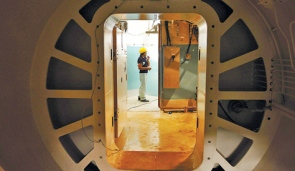UPDATES
Iran’s latest nuclear gambit
September 6, 2011 | Daniel Meyerowitz-Katz

According to recent reports Iran may be attempting to strike back at the West for the alleged cyber warfare that it has been suffering in recent months. As AP has identified, Iranian involvement may be behind recent attacks on US internet giants, as well as the CIA.
AMSTERDAM — Hackers who broke into a Dutch web security firm have issued hundreds of bogus security certificates for spy agency websites including the CIA as well as for Internet giants like Google, Microsoft and Twitter, the government said Monday.
Experts say they suspect the hacker – or hackers – operated with the cooperation of the Iranian government.
While these hackings serve as further proof of Iran’s persistent belligerence to the West, it is not only in the US and Europe that public opinion has been turning against the Islamic Republic. Public intellectual Walter Russell Mead has noted that Iran has been losing support throughout its own region due to its continued support for long-time ally Bashar al-Assad, despite his brutal suppression of the Syrian people. As Mead observes, this dramatic loss of support, as well as the likely fall of Iran’s closest ally, means that it is now far harder for the Iranian regime to stand up to international calls for a halt to its nuclear program.
Many critics of the Iraq War pointed to Tehran’s apparent gains across the region as proof that the strategy was deeply flawed; in fact the realignments taking place across the region these days suggest that Iran is being pushed toward the fringes of Middle East politics. With Turkey more of a factor than before, and Saudi Arabia and its allies focused on their Shi’a religious and political archrivals, there is less room for Iranian meddling than the mullahs had hoped. Nothing lasts forever in the kaleidoscopic world of the Middle East, but for now Iran will have to face the critics of its nuclear program with fewer allies and less ability to summon public opinion to its side.
As if on cue, the International Atomic Energy Agency released a report on the weekend that expressed increasing concerns that Iran is trying to obtain nuclear weapons. The report also contained new intelligence that Iran is building nuclear warheads as well as continuing its illegal enrichment program even in nuclear facilities in which IAEA inspectors are allowed, while attempting to re-enforce its facilities against further cyber attacks. As Haaretz reported:
According to the report by the International Atomic Energy Agency, Iran has installed new and improved 2IR as well as 4IR centrifuges, which according to experts, will be immune to cyber attacks that were able to breach the older centrifuges.
The centrifuges have allegedly been installed, the report states, in a fortified underground facility for uranium enrichment near the city of Qom.
… The IAEA report restates the fact that Iran ignores any Security Council decisions calling on it to halt its uranium enrichment, and that the Islamic Republic only partially cooperates with the organization, while refusing to provide any required documents.
… Furthermore, the report details unnamed intelligence sources, most likely from the West, which claim that Iran is performing a series of actions and experiments, from which it seeks to assemble a nuclear warhead.
The latest report expresses what it called “increasing concerns,” over Iran’s nuclear aspirations, harshening the rhetoric from the organization’s previous reports.
Of course, none of the information in the report would come as a surprise to anyone regularly following developments in Iran. Perhaps more surprising has been the Iranian response. After months of open defiance, it seems that, facing the loss of regional support and increasing pressure from the international community, Iran has decided to raise a new diplomatic opening. AP has reported that the head or the Iranian nuclear program has offered full cooperation with the IAEA in return for the easing of sanctions. That said, it is not clear what exactly this would entail.
Vice President Fereidoun Abbasi told the semiofficial ISNA news agency, “We proposed that the agency keep Iran’s nuclear program and activities under full supervision for five years provided that sanctions against Iran are lifted.”
He didn’t elaborate what he meant by “full supervision,” or how far the International Atomic Energy Agency could go in trying to prevent Tehran’s nuclear program from producing weapons. Iran has always insisted that its program is peaceful, but the IAEA has give successively stronger warnings over the years about potential military dimensions to Iran’s nuclear program.
That Iran has given a little ground appears to be a positive sign, indicating that the Tehran is feeling the proverbial “heat”. That said, it would be extremely risky to take this offer at face value. Over the last few decades, the Iranians have repeatedly offered supposed diplomatic openings when under pressure; however, these have always amounted to nothing. By creating a new round of negotiations and political debate, the regime can buy time and continue its nuclear efforts unhindered, all the while attempting to divide the coalition united against its nuclear program.
Moreover, Iran’s offer to fully cooperate with the IAEA is not an especially meaningful concession; rather, it is merely an offer to fulfill Iran’s current obligations under the Non-Proliferation Treaty. The Security Council sanctions target Iran’s illegal uranium enrichment – unless this is halted, Iranian diplomatic concessions should be taken with a pinch of salt.
Daniel Meyerowitz-Katz
Tags: Iran





